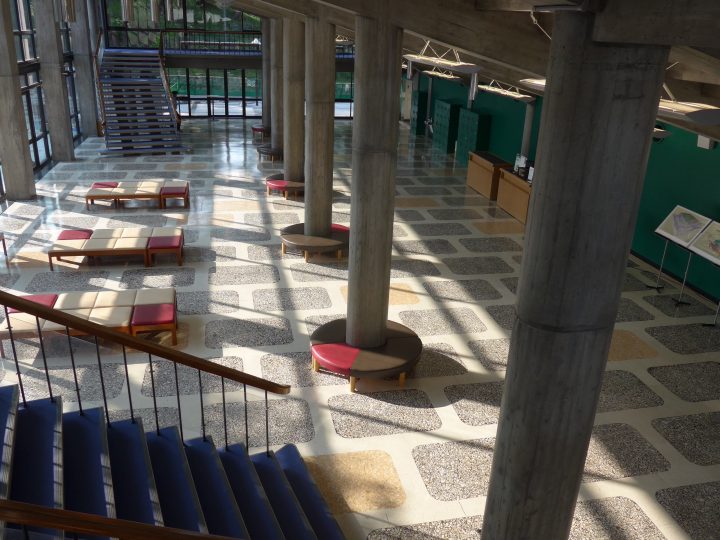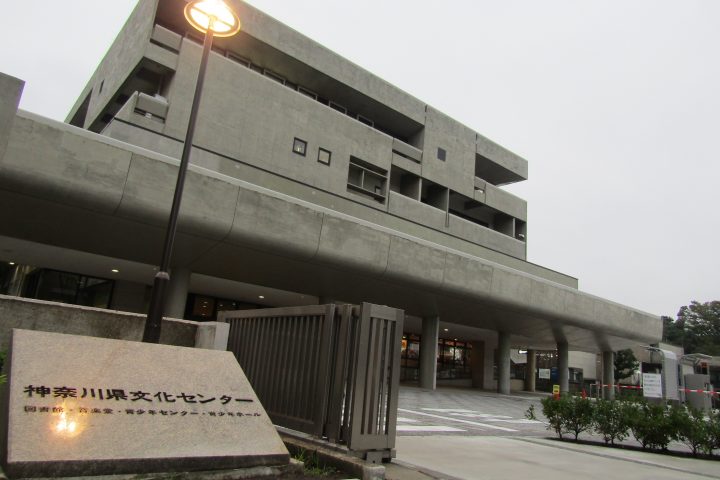Providing everyone with equal opportunities to enjoy culture and the arts: Kanagawa Prefectural Civic Hall's efforts in response to the Act on the Elimination of Discrimination against Persons with Disabilities
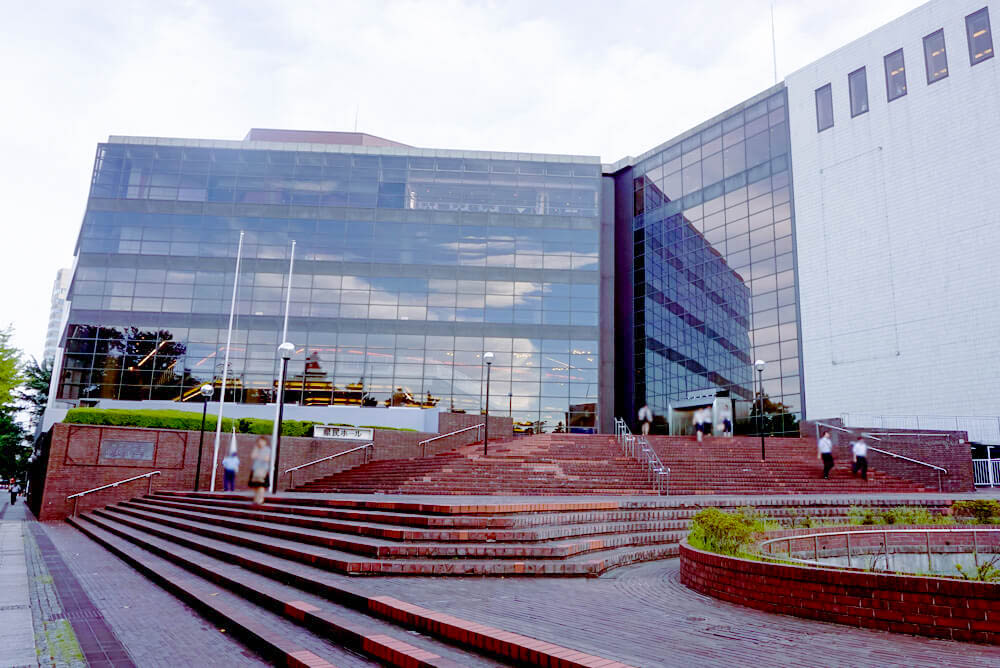
The first part of the event featured a "Lecture on the Act on the Elimination of Disability Discrimination" by Koji Onoue, Vice-Chairman of the Japan Council of Disabled Persons International, who explained what "provision of reasonable accommodation" means in the Act, which came into force this year. The second part featured a panel discussion between representatives of the four disability-related organisations that were hosting their conference at the hall, and the Kanagawa Prefectural Civic Hall Facilities Management Division.
What is "reasonable accommodation" for people with disabilities?
"Unfair discriminatory treatment" refers to, for example, being refused entry to a store, being denied a lease on a house, or being refused entrance to an exam or enrollment by a school because of a disability. "Reasonable accommodation" refers to consideration given to the characteristics and difficulties of a disability so that people with and without disabilities are "given equal opportunities and participation" in education, employment, and other aspects of social life.
With the enforcement of the Act on the Elimination of Discrimination against Persons with Disabilities, public institutions such as governments and schools are now required to provide this "reasonable accommodation" as much as possible. Private businesses such as general companies and stores are also now required to make an effort.
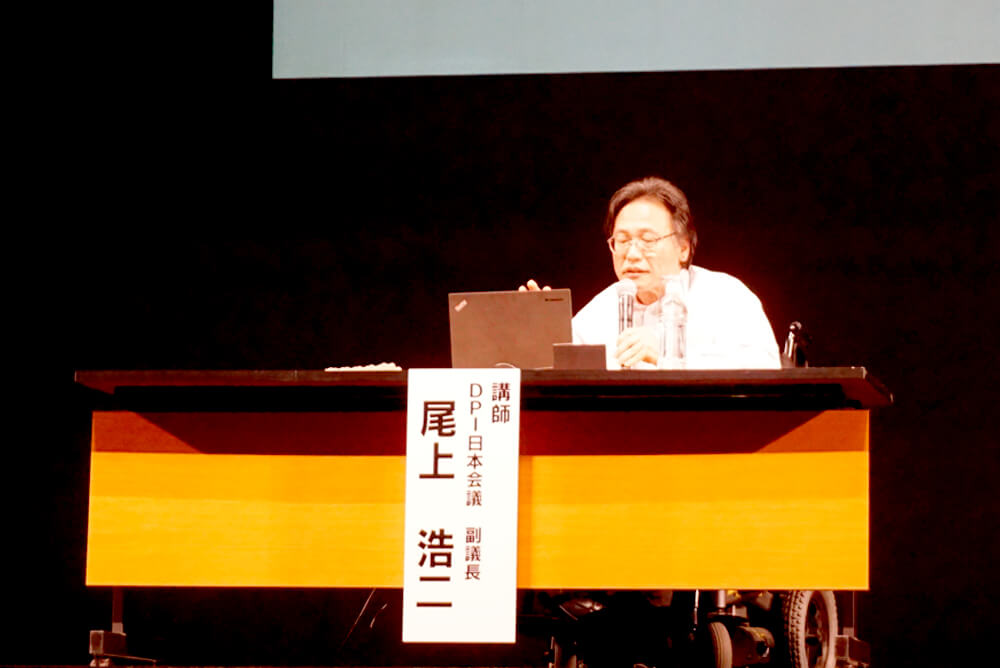
Mr. Koji Onoue, Vice-Chairman of the Japan Council of Disabled People's International (DPI)
The speaker for the first part, Onoe Koji, uses a wheelchair due to a leg disability, and he gave a clear explanation of this "reasonable accommodation" as follows:
"A wheelchair user was able to go to a concert by his favorite popular rock band. However, when he arrived at the venue in his wheelchair, the venue staff asked him to leave a few songs before the end of the concert because they expected it to be very crowded.
I really wanted to see the encore, so I said I didn't mind being the last to leave the venue if I could watch until the final encore, but they replied "What if something happens..." and I was reluctant to agree.
This person managed to negotiate persistently with the venue staff and was able to watch the encore by leaving the auditorium last. However, when he remembered the concert that should have been fun, the unpleasant exchange came back to him at the same time, and it became a very complicated memory.
After this talk, Onoue-san asked us what was missing from the "what if" the venue staff mentioned.
It is a lack of concrete consideration of what would happen if something "really" happened. Instead of trying to think about it, they try to make the person with a disability bear the responsibility and patience for "what if" something were to happen.
By imagining each and every possible scenario that could happen "if something were to happen" and thinking about what to do in that case, or in this case, problem-solving becomes more concrete, and measures such as setting up the necessary equipment, rules, or improvements can be developed.
By doing so, more people with disabilities can enjoy concerts just as much as those without disabilities. This is what it means to provide "reasonable accommodation."
"You can't be given special treatment" or "There is no precedent" are just examples of stopping to think. Being indifferent to the needs of people with disabilities without changing yourself is a major barrier to "reasonable accommodation" and constitutes "discrimination against people with disabilities."
Kanagawa Prefectural Hall's Approach to "Reasonable Accommodation"
The second part was moderated by Onoue, who also took the stage at some of the events, and consisted of a panel discussion featuring Komai Yuriko from the Facilities Management Division of the Kanagawa Prefectural Civic Hall, Todo Eiko, president of the NPO EDGE, which supports people with dyslexia, a condition that causes difficulties in reading and writing and which organized the recent national conference of disability-related organizations, Yoda Chikako, president of the Kanagawa Hand in Hand Development Association, which is made up of parents and supporters of people with intellectual disabilities, Ishibashi Masaaki, president of the Kanagawa Federation of Parents' Associations for Children and Adults with Physical Disabilities, and Kawahara Masahiro, chairman of the Kanagawa Federation of the Deaf.
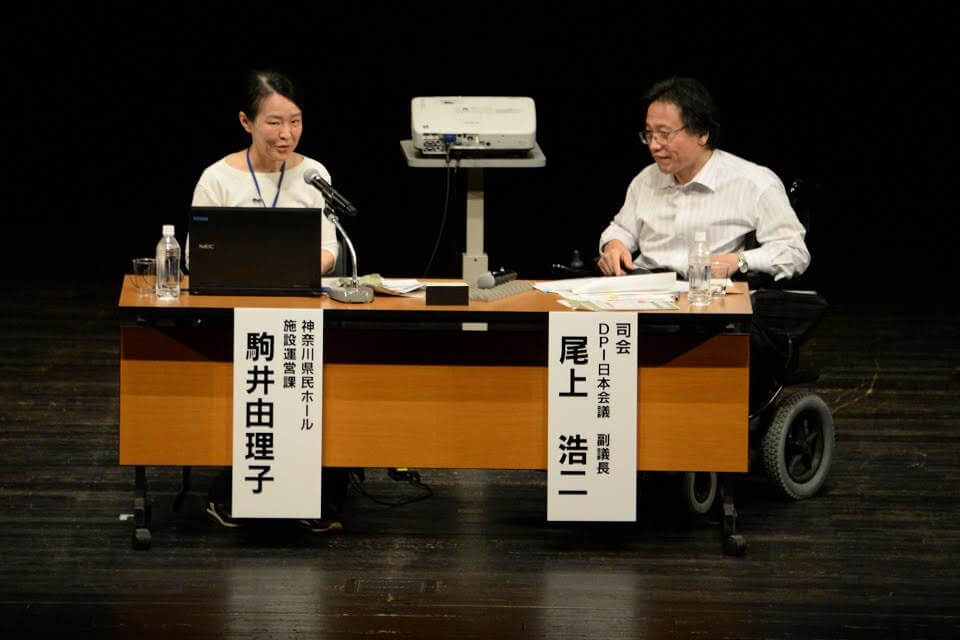
Kanagawa Prefectural Hall Facility Management Division Yuriko Komai
Located in a location overlooking Yamashita Park, a popular tourist destination in Yokohama, Kanagawa Prefectural Civic Hall is a large cultural facility with a long history and tradition, which opened 41 years ago this year. The design was well thought out as a state-of-the-art building for the time, but from the perspective of barrier-free access, it was still old and there were many issues to be addressed, such as removing steps and improving the toilets.
Although it is difficult to change a building, the Prefectural Civic Hall held study sessions on barrier-free access and spoke to people working at and using other facilities for people with disabilities, and by changing the staff's awareness, they were able to work toward resolving the issues surrounding the tournament.
We will introduce the preparation process leading up to the tournament, which was carried out through repeated dialogue between Kanagawa Prefectural Civic Hall and each organization, as well as the opinions each organization expressed from their perspective regarding disabilities, and suggestions for the future.
1. Consideration for users with reading and writing difficulties
Eiko Todo, president of the NPO EDGE, gave the following explanation about dyslexia, a disability that is still not very well known in Japan:
"Dyslexia is a disorder in which there is nothing wrong with the senses of sight or hearing, and no intellectual problems, but there is a significant difficulty in the ability to read and write. The shapes of letters and the parts that make up letters appear to move or stick together, making it difficult for the person to receive information in the form of letters."
For this reason, the Prefectural Civic Hall held a hearing on the shape of characters that are easy for dyslexics to read, and changed the font of the characters in the questionnaires and pamphlets from the decorative Mincho font to a rounded Gothic font, which is considered to be easier to read. They also incorporated measures to make the text easier to read, such as leaving more space between lines and phrases.
Todo made a suggestion for the future, saying, "The information signs within the venue had a lot of text and were difficult to understand, so it would be good if they were displayed in pictograms (diagrams) instead."
2. Consideration for people with intellectual disabilities and wheelchair users
There are toilet issues for people who need help washing their hands and for tournaments where many wheelchair users attend. However, the Prefectural Civic Hall has eight wheelchair toilets (two of which are underground, so six).
Regarding the hall's efforts to address the issue of the number of toilets, Yuriko Komai of the Facilities Management Division said,
"We assigned staff to each toilet so that they could be used without congestion on each floor, and we shared information about the congestion level using intercoms to ensure smooth guidance. Also, although it is not possible to immediately install more elevators, we dealt with the situation by making use of elevators that are used for bringing in goods and by making operational improvements such as not stopping elevators on other floors on the day (by not allowing staff to use them and not allowing other events to be held on the same day)," he said.
Ms. Yutaka Yoda, Chairperson of the Kanagawa Prefecture Hand-in-Hand Development Association, an organization for people with intellectual disabilities, said:
One opinion was expressed: "There are people who need assistance using the toilet even if they are not in a wheelchair. When entering a private room with a helper of the opposite sex who is not easily identifiable as a disabled person, they may be concerned about being seen by others. It would be good to see gender-free universal toilet signs become more widespread, in addition to signs for wheelchairs and ostomates."
Mr. Akira Ishibashi, chairman of the Kanagawa Prefecture Federation of Parents of Children with Physical Disabilities, said:
One suggestion was, "It would be good to have a place (care room) where diapers can be changed not only for children but also for adults."
This time, Ishibashi researched barrier-free routes for wheelchair users from Haneda Airport and Tokyo Station to Yokohama in advance and guided visitors there.
The Prefectural Civic Hall has posted on its website detailed photographs of the barrier-free route from the nearest Nihon-odori Station to the venue.
In addition to these soft measures, the Prefectural Civic Hall also took measures to ensure that essential equipment was installed, including a new staircase called "Flex Step" that can also be used as a lift for wheelchair access in the area leading to the stage waiting room.
Until now, the only way to raise and lower wheelchairs was by hand, so once speakers had been lifted up, they felt uncomfortable disturbing those around them and found it difficult to move from the spot.
However, this Flex Step does not require an assistant to operate, so wheelchair users can now freely enter and exit the stage waiting room and outside by themselves. The design is not boring like a luggage lift, but rather has a nice furniture-like feel, and has been very well received.

Flex Step is a set of stairs that can be used as a lift when using a wheelchair.
3. Consideration for users with hearing impairments
Next, Mr. Masahiro Kawahara, Chairman of the Kanagawa Prefectural Federation of the Deaf, spoke.
"The difficulty with being deaf is that in everyday life it is hard to tell from appearances that you have a disability, so people tend to ignore you when they talk to you. Also, because you cannot receive the information that naturally comes in through your ears, there is a big gap between hearing-impaired people and those who can hear when it comes to obtaining information and knowledge."
He explained the difficulties faced by the hearing impaired.
One concern regarding holding this tournament, which will bring together many people with hearing impairments, was how to announce emergencies such as earthquakes, but the Prefectural Civic Hall did not have an electronic bulletin board capable of displaying text messages.
So at this tournament, we prepared to display a large message on the screen behind the stage if there was an earthquake alert or something similar.
In addition, the requests made by Mr. Kawahara and others during the preliminary hearings were as follows:
"I want the start of the show to be signaled not just by a buzzer, but by slowly flashing the lights."
"We would like venue staff to carry writing utensils for written communication and illustrations of the venue, and to guide people by pointing at them,"
In response, the hall staff signaled the start of the show by flashing the lights, and the venue staff learned simple sign language that could be used to greet people and give directions to the venue. They also carried writing utensils so that people could see them in order to communicate in writing, to convey the message that "we are ready to communicate with you."
Kawahara praised the Prefectural Civic Hall's response, saying, "When renting a venue before, the venue staff had never asked me in advance if I had any requests, so it was very helpful that they asked me in advance."
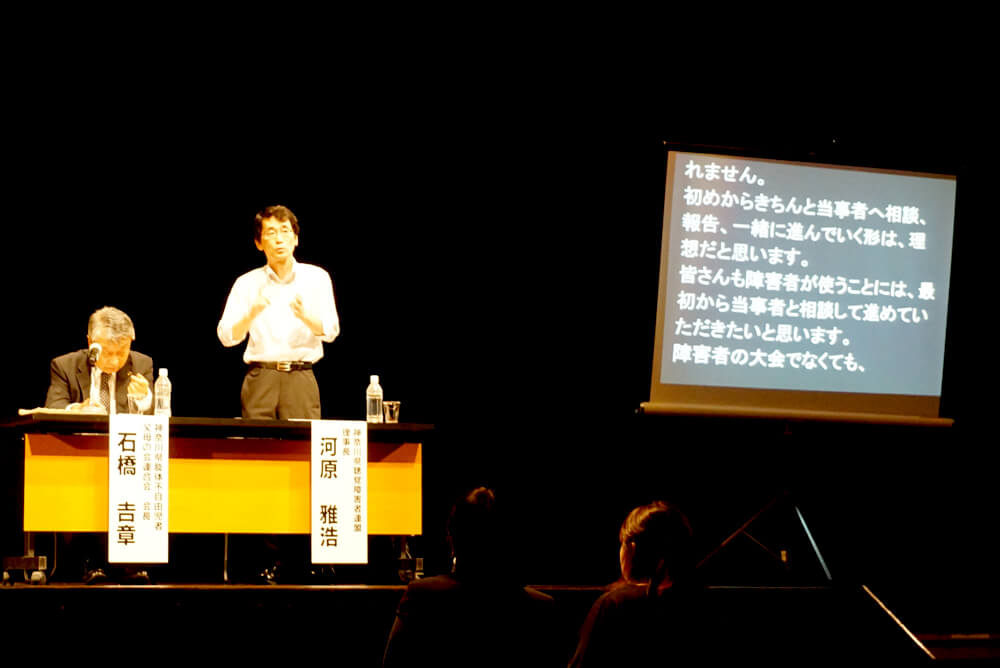
Masahiro Kawahara, Chairman of the Kanagawa Prefectural Federation of the Deaf
4. Consideration for users with intellectual disabilities, developmental disabilities, and autism
Many people with dyslexia also have developmental disorders, and the characteristics of each were explained by Mr. Fujido, chairman of the NPO EDGE, and Mr. Yoda, chairman of the Kanagawa Prefecture Hand in Hand Development Association.
For example, there are people who have difficulty sitting still for long periods of time, people who are sensitive to the volume of sound, echo, brightness or flickering of lights, people who become uneasy if things do not go according to plan, people who have difficulty immediately understanding instructions that are announced when an accident occurs, etc.
We had thorough discussions between the group and the venue about these characteristics, and we tried to find the best common ground for each point, such as how to include breaks, how to arrange lighting and sound effects, how to set aside rehearsal time, and the wording to be used in announcements if something happened.
For example, when an earthquake or other disaster occurs and evacuation orders are issued, people with these disabilities tend to become anxious and panic.
Therefore, instead of saying things just to stop someone from doing something, such as "Please don't push" or "Please don't run," it is important to be specific about what you want them to do, such as "Please walk slowly," and speak calmly to them.
In response to this, the Prefectural Civic Hall carefully chose words that were easy to read, understand, and answer in the earthquake announcements shown on the screen and in the questionnaire that people filled out after the tournament.
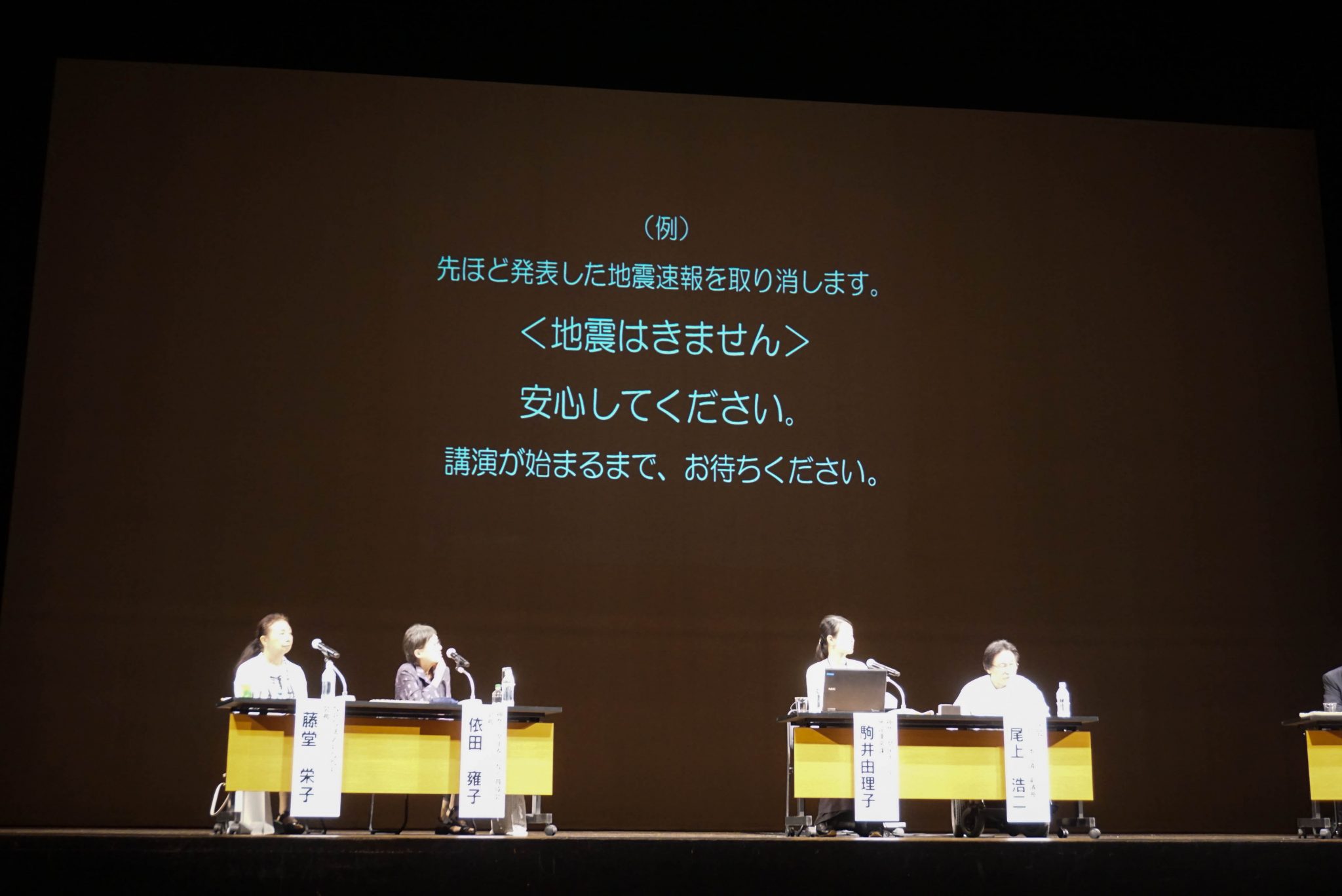
Improvements to Earthquake Early Warning Announcement Text
Towards an inclusive society, we must first change the soft aspects
Komai of the Prefectural Citizens Hall has been in contact with various organizations to understand the necessary considerations for people with various disabilities and enable as many people as possible to enjoy using cultural facilities. First of all, he checked what the barriers would be, had staff try out the facilities, gathered information from other facilities, and thoroughly listened to the people with disabilities.
From there, they extracted problems, considered solutions, narrowed down the options and proposed alternatives, implemented what could be implemented, and moved on to the next challenge for what could not.
In this way, we first listen to the people involved, then discuss and report repeatedly in order to reach an agreement. This symposium taught us that the accumulation of these dialogues will remove barriers one by one.
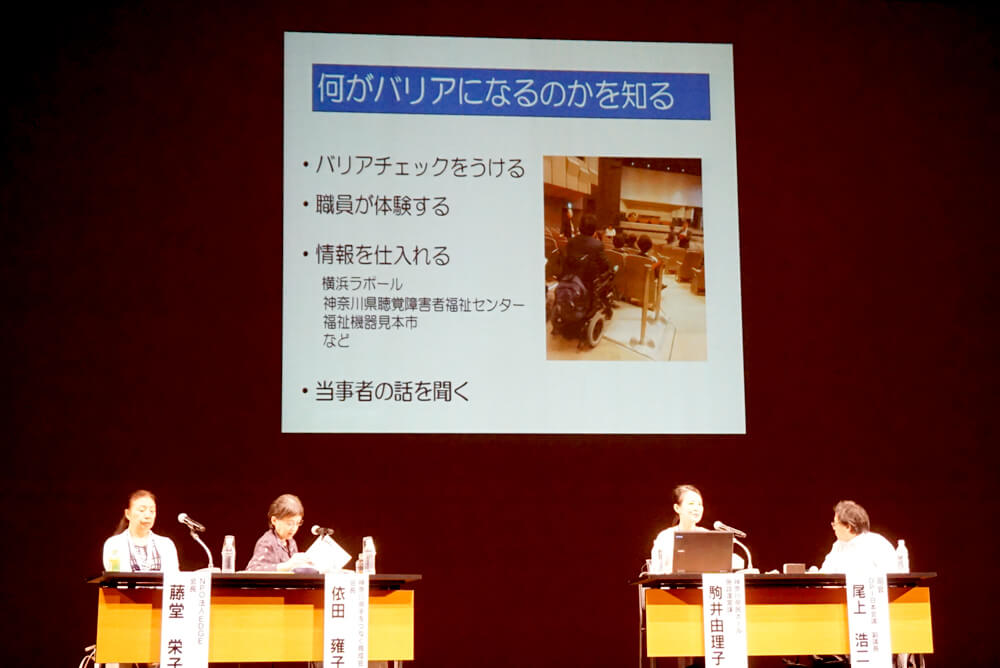
To understand what the barriers are
The Act on the Elimination of Discrimination against Persons with Disabilities came into force this year, but do you know to what extent facilities for cultural and artistic appreciation and sporting events in Japan are barrier-free?
According to Onoue of the Japan Council of Disabled People International (DPI), for example, out of the 46,000 seats at the Tokyo Dome, there are only 12 wheelchair seats. Moreover, caregivers are required to sit behind the wheelchairs, so they cannot enjoy watching baseball games side by side.
By the way, Yankee Stadium in the US has 68 wheelchair seats, with 200 to 300 seats, so you can choose your favorite seat. There are also extra-large elevators and large ramps to make movement easy.
This is just one example, but it shows that there has been a big difference in awareness between Japan and the United States regarding "opportunities for social participation" for people with disabilities.

Response and implementation process
In order to build an inclusive society (where no one is isolated or excluded, but is embraced and supported as a member of society) in which everyone, regardless of whether they have a disability or not, can equally enjoy appreciating culture and the arts or watching sporting events, the first thing we can do is to change the "soft" side of people.
There are many reasons why the hard side of things cannot be done immediately, such as the building's age, inconvenience, and limited budget, but we learned from the Prefectural Civic Hall's efforts in hosting the various organizations' conferences that if the awareness of the people working there changes, they will be able to proactively learn about the needs of people with disabilities, which will lead to ideas and wisdom for solutions, and little by little improvements can be made.
This example will be very helpful not only to other public facilities but also to ordinary companies and stores, and will surely have a spreading positive impact.
- ・Kanagawa Prefectural Hall http://www.kanagawa-kenminhall.com/
- ・Kanagawa Prefectural Hall [Becoming barrier-free little by little] page http://www.kanagawa-kenminhall.com/info_detail?id=951
- ・NPO EDGE (Edge) Creating a society where people with dyslexia can thrive http://www.npo-edge.jp/
- ・Zenshiren Hibiki (National Federation of Parents' Associations for Children with Physical Disabilities) https://www.zenshiren.or.jp/
- ・National Hand-in-Hand Nurturing Association http://zen-iku.jp/
- ・Kanagawa Prefectural Federation of the Deaf (Kanchoren) http://kdfr.web.fc2.com/
- ・Promotion of the elimination of discrimination based on disability – Cabinet Office http://www8.cao.go.jp/shougai/suishin/sabekai.html
